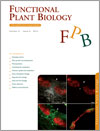
Functional Plant Biology
Volume 41 Number 6 2014
FP13339Environmental stress activation of plant long-terminal repeat retrotransposons
Abiotic and biotic stresses activate long-terminal repeat retrotransposons in photosynthetic eukaryotes. In this article, we reviewed the ways that retrotransposons are activated by environmental stimuli to affect restructuring and diversification of the host genome. We recommend the use of RNA-Seq data of other plant species (e.g. Rhazya stricta) to get a deeper view of activation patterns.
FP13254Variation in mesophyll conductance among Australian wheat genotypes
Conductance to CO2 diffusion within leaves (mesophyll conductance) forms a significant and variable limitation on photosynthesis but remains poorly understood. Here, mesophyll conductance was found to vary 2-fold among wheat genotypes, and to be positively related to photosynthetic rate. These results suggest that both photosynthetic rate and water-use efficiency could be improved through breeding for higher mesophyll conductance.
FP13224Spring barley shows dynamic compensatory root and shoot growth responses when exposed to localised soil compaction and fertilisation
The effects of localised soil compaction plus nutrient availability on root system architecture (RSA) and root growth dynamics have scarcely been investigated. We investigated the impact of heterogeneous soil conditions on barley RSA, and root and shoot growth using split-root rhizotrons, and observed dynamic compensatory alterations, particularly in lateral root initiation. In loose compartments formation of lateral roots started earlier than in uniform treatments and was significantly increased in compacted compartments when only these compartments were fertilised.
FP13267Assessment of phloem mobility of xenobiotics in Triticum aestivum and Brachypodium distachyon
Measurement of the phloem translocation of herbicides is a challenge, especially at the initial development of compounds. B. distachyon was evaluated for potential use in phloem bioassay showing a clear evidence of xylem discontinuity. This novel bioassay provides an opportunity to determine quantitatively phloem mobility of molecules in vivo without the use of radiolabel and with a high throughput during the early stages of pesticides research.
FP13327Is the differential response of riparian plant performance to extreme drought and inundation events related to differences in intraspecific trait variation?
Climate change scenarios predict an increase in extreme climatic events. In our study we tested the effects of multiple extreme events on plant performance and trait intraspecific variation, and discovered that trait intraspecific variation was not induced by extreme events. However, multiple extreme events have quantitatively and qualitatively different impacts on plant performance than single events and it is difficult to predict those impacts beforehand, which hampers predicting plant responses to a future climate.
FP13286Does the hydrocooling of Vitis vinifera cv. Semillon vines protect the vegetative and reproductive growth processes and vine performance against high summer temperatures?
Heat events are a natural summer occurrence in Australian vineyards but costly in lost production, thus, protecting vines during these events is an economically important issue. We have assessed spraying water onto vines for brief periods as a means of reducing canopy temperatures. The canopies were nearly 10°C cooler during the heat events and both yields and berry composition were improved, suggesting spraying water onto vines is an effective means of reducing impacts of high temperatures.
FP13271Morpho-structural and physiological response of container-grown Sangiovese and Montepulciano cvv. (Vitis vinifera) to re-watering after a pre-veraison limiting water deficit
The intraspecific diversity of Sangiovese and Montepulciano grapevine varieties is accentuated under early water deficit. Higher physiological and productive efficiency under non-limiting water supply noted by the near-isohydric Montepulciano compared with the near-anisohydric Sangiovese was reversed when both cultivars were subjected to a pre-veraison water deficit. Sangiovese had excellent net CO2 exchange (NCER) recovery upon re-watering and is confirmed to be better adapted to dry/hot conditions.
FP13235Stomatal pore size and density in mangrove leaves and artificial leaves: effects on leaf water isotopic enrichment during transpiration
In order to further the use of plant biomass stable isotope ratios as a proxy for environmental stressors such as drought and salinity, we must understand the long-term impact of such stressors on the isotopic composition of leaf water. Here we show with stomatal count and artificial leaves, that the lower leaf water isotopic enrichment observed in mangroves compared to freshwater plants is due their larger and lower density of stomatal pores. Our results have important implications in interpreting paleoclimate with tree ring oxygen isotope ratios, since stomatal frequency and size has varied over the ages.
FP13335Over-expression of SlCycA3 gene in Arabidopsis accelerated the cell cycle transition
Since the connection between cyclins and plant development involving plant hormones is poorly understood, we characterise the SlCycA3 gene to determine the effect of A3-type cyclin gene on cell-cycle-related plant growth and its regulation mechanisms under auxin treatment. Our results showed that overexpression of the SlCycA3 gene accelerated root growth and development. Cyclin abundance may function as a regulator to control root growth in response to plant hormone treatment.




